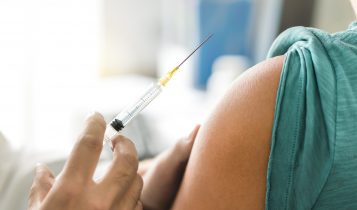The world needs to prepare in combating complex molecular strains of invisible microbes. Researchers, scientists, and healthcare professionals working in pharmaceutical companies are striving hard to develop new vaccines to prepare for the existing and future health needs of the public. Because new viruses and bacteria are proliferating and mutating, vaccines need to undergo continuous comprehensive studies.
Vaccines stimulate the production of antibodies by the immune system. It works by exposing the body to the disease with just enough material to develop immunity but not cause severe signs and symptoms. Vaccines have been developed for viral diseases such as measles, flu, and polio. Now with the COVID-19 pandemic, people rely on the promising effects of vaccines in combating life-threatening complications of this viral infection. One of the common questions people raise is whether vaccines can cause health problems. This article will discuss the possibility of such.
Can Vaccines Cause Health Problems?
Vaccines are the most effective way to prevent infectious diseases. Every year, they prevent 3 million deaths worldwide. However, in some very rare cases, it is possible that vaccines may cause health problems.
- Mild Health Problems: The common side effects of most vaccines include fever, chills, pain in the injected area, headache, fatigue, and muscle pain. However, these side effects are normal and are usually experienced by a majority of recipients.
- Moderate To Severe Health Problems: Some of the moderate to severe health problems that are caused by vaccines include eczema or severe rash, severe brain reaction or encephalitis, and serious eye infection and loss of vision. Eye infections happen when the dormant virus in the vaccine spreads to the eye. This usually occurs in patients with weakened immune systems.
Reasons Why Vaccines May Cause Health Problems
People need vaccines as vital protection against viral diseases. The vaccine helps a recipient’s immune system “recognise” the virus and deal with it in a stronger way. However, there are times when rare and isolated incidents occur, causing vaccine-related injuries, such as anaphylaxis, thrombocytopenia, or massive bleeding due to low platelet count and wrongful death.
For patients who are exposed to such health risks, talking to vaccine injury lawyers is a step in the right direction. Lawyers can help patients demand damages and charge negligent companies or vaccine administrators if there is negligence on their part. In many instances, health issues that are reported by some patients are not caused by the vaccine per se. Rather, it’s because of the mishandling of the vaccine.
Manufacturing Error
Drug or pharmaceutical companies follow strict health and safety protocols to pass the series of checks by healthcare organisations and government agencies like the Food and Drug Administration (FDA). They conduct several trials for newly discovered vaccines over a five-year period to ensure everyone’s safety upon mass vaccination. However, there could still be a possibility of manufacturing error. Here are the examples of manufacturing errors:
- Mislabelling: For instance, if the pharmaceutical company failed to disclose on the label or literature the possible side effects or adverse effects of the vaccine, the company would be responsible for any damages.
- Misrepresentation: One example of misrepresentation is if the pharmaceutical company indicated ingredients on the vaccine label that aren’t really contained in the vaccine.
- Authentication Failure Of Vaccination Status: Obtaining the vaccination status of patients is important before administering the vaccine. However, some patients have no written record of their previous vaccinations due to forgotten, missing, inaccessible, or lost health records. Giving the vaccine without first knowing the vaccine history of a patient could result in health problems. Vaccine health issues may also result if there are errors in the date of vaccination (interval between doses).
- Health Personnel Vaccine Administration Error: If the nurse, doctor, or any other healthcare worker administered the vaccine without following the right dose (overdose or under dose) or the right route, it could result in serious injury or health problems. When this happens, the healthcare worker may be held accountable for being negligent.

Other examples of administration vaccination errors include the following:
- Inappropriate Prescription: The doctor prescribed the incorrect medication for the patient’s medical condition.
- Administering Expired Vaccines: For instance, the vaccine was injected after exposure to ambient temperature for more than 24 hours or more than four hours after reconstitution.
- Not Following Proper Storage Conditions: This happens when a cold chain break occurs due to unmonitored freezing or thawing.
- Improper Technique: Giving the vaccine in a different body area may affect the efficacy of the drug and may cause side effects. In addition, it includes injecting the vaccine too fast or too slow. Another example is forgetting to flush or excessive flushing, forcing part of the liquid drug out of the syringe, affecting dosage.
- Failure To Conduct Final Checks: The healthcare professional fails to check the patient’s status after the vaccination.
- Self-Administration Of Vaccines: Consumers should be aware that the self-administration of vaccines is not advisable. An example of this scenario is an individual who buys a vaccine from either reputable or unknown sources and then administers the drug to his or her body without knowledge and experience on how to administer the medication properly.
- Lack Of Patient Assessment And Education: Healthcare professionals and facilities are responsible for providing patient education about the benefits, side effects, and adverse effects of the vaccine they will give. They are also responsible for assessing the condition of the patients if they are physically fit to receive the vaccine.
Healthcare agencies are responsible for identifying vulnerable or high-risk groups for vaccination, such as patients with spinal cord injuries. They need to disseminate the right information to the public across various media channels and deployment of healthcare workers in local communities.
If healthcare workers fail to do these preliminary activities, vaccination could result in severe health problems. For instance, one of the contraindications of some vaccines is hypertension or high blood pressure. If the nurse fails to obtain the patient’s blood pressure with an existing medical condition, it could result in cardiovascular problems and even wrongful death.
Vaccines are the most effective way of protecting ourselves and our loved ones against infectious diseases. However, in very rare incidents, vaccines can potentially cause health problems, especially if the manufacturer was negligent in labelling and representing their product. There are many reasons that could result in vaccine-related injuries as discussed above. If you or a loved one is a victim of vaccine-related health problems and injury, talk to a personal injury lawyer as soon as possible to determine your legal options.






















